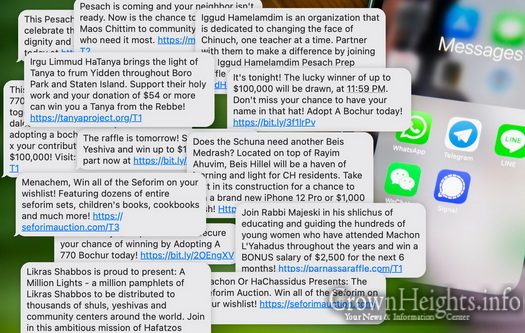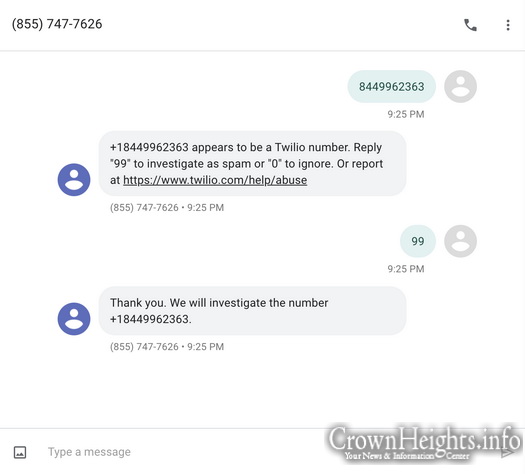
Op-Ed: How to Stop the Tzedaka Spam?
by A Beleaguered Donor
At this point it’s so common that it’s unremarkable. You open your phone to find another spam message. It usually looks something like this real text: “The Raffle has begun! Support the spreading of Chassidus and win 3 round trip tickets to Israel + a stay at the Waldorf Astoria”.
You then proceed to reply STOP, which in theory should stop all further communication from this organization. Except it doesn’t. The next day you get another text from another number. One day it’s 833-906-2071 and the next day it’s 844-813-7730 (both real numbers from which I received spam texts this month). On careful examination you might even notice the tracking on the links included in the texts keep changing. The link in the first text will often end in /T1, second in /T2 etc.
Why does this keep happening? Why do the tzedaka calls, emails and texts never end?
So I did an experiment. I started using a unique email address with every campaign I donated to. To the credit of most of the organizations I donated to, they were honest and upright and I did not receive any email to that unique email’s inbox.
But with a few campaigns it was unfortunately not the case. After donating to one campaign a while back using a unique email address, I received 60 spam emails.
Think about that for a moment. 60 spam emails all as thank you for a single donation I made.
Emails came from Maos Chitim, Chayal el Chayal, 770 Yeshiva, Keren Meir, The Tesla Raffle, Bais Hillel, Mikvah Auction, Tanya Project, and many more.
After a bit of digging I learned what is apparently an open secret in our community – all these campaigns are being managed by Likras Shabbos, a local organization that distributes weekly Chasidus pamphlets.
For a cut of your campaign, they will make calls using their call center, send regular incessant SMS messages and most importantly let you use their ever growing list. And this list keeps growing because they continuously harvest contact info brought in by every campaign they run. And they take a larger cut of donations that come in via their “own” list.
Looking through the spam SMS messages I received over the past few months, almost every single message was from one of the campaigns listed above managed by Likras Shabbos.
Now Likras Shabbos is not the only offender. A more common tactic among organizations is to swap lists of contact info with other organizations though they may only share emails and not phone numbers, or only a set amount of contact (e.g. 500 emails for 500 emails).
Sharing the contact info we submit while making a generous donation is a violation of our privacy and really a poor way to thank donors who are trying to help you further your cause. Unfortunately this makes it less likely for me to donate when I know that any donation will be repaid with only more spam. And in cases where organizations are swapping donation amounts along with the contact info, that’s literally the case as call centers will go after the “larger fish” when they can see your past donation history.
These lists of our private information turn into commodities where organizations are trading them as valuable. I’ve heard of lists being worth tens of thousands of dollars, meaning sending a pitch to a particular list is guaranteed to net you a significant chunk of change. And as seen with Likras Shabbos’ platform, they take a larger cut from the organization when a donation is from a donor on their list.
So what can we do about this?
One simple suggestion is to report unsolicited SMS messages that you get to the SMS provider. At the moment (almost) all of these SMS messages are being sent via Twilio, a paid service that sends mass SMS messages.
Twilio’s messaging policy is quite clear that all messaging being done on their platform requires prior consent.
“Prior to sending the first message, you must obtain agreement from the message recipient to communicate with them”
“Consent can’t be bought, sold, or exchanged. For example, you can’t obtain the consent of message recipients by purchasing a phone list from another party.”
“The consent applies only to you, and to the specific use or campaign that the recipient has consented to.”
And the policy makes clear that they will enforce their policies with appropriate action when necessary:
“we reserve the right to suspend or remove access to Twilio’s platform for customers or customers’ end users’ that we determine are not complying with the Messaging Policy”
So if you receive an unsolicited SMS message simply text Twilio at 855-747-7626 with the number where the spam SMS message was sent from. Alternatively you can email them at stopspam@twilio.com.
More generally we need to make it clear to the organizations that while we value everything they do for our community, the aggressive tactics, lack of concern for privacy either on their part or by the platforms that they use, make it less likely that we will be interested in donating to their organization. So long as we incentivize these tactics by producing results, we remain the product and our info will be freely shared or sold as a commodity.
When we as a community make it clear with our wallets that we want to help support our tzedakas but want them to stay away from shady platforms and tactics, that’s when we will see a positive change for the better.
UPDATE: It appears that they have switched their text provider to Bandwidth.com, and are no longer using Twilio. Spam messages can be reported via a form at https://www.bandwidth.com/legal/report-a-phone-number/ or by responding to the unwanted text with ‘STOP’ followed by ‘REPORT’.
Worth noting that Bandwidth.com is not the provider they deal with directly – Bandwidth.com in turn sells their service to other companies. Bandwidth.com forwards all the complaints to the company that is handling the campaign.















